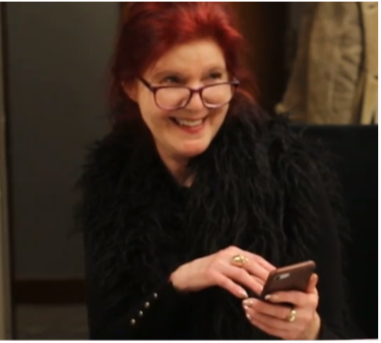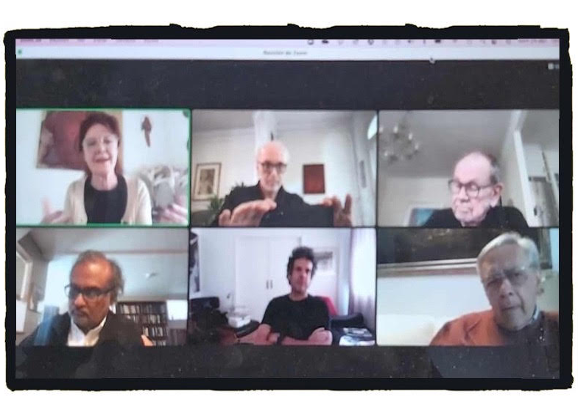July 2022
Inter-Regional Encyclopedic Dictionary of Psychoanalysis Committee (IRED)
Multiple Voices on IRED’s unique features and experience
The IRED page on the IPA website contains the description of the mandate, the methodology, IPA IRED Congress Panels presentations, copyright, and the IRED e-book (over 670 pages in English), whose entries are being gradually translated into 14 languages:
https://www.ipa.world/IPA/en/Encyclopedic_Dictionary/English/Home.aspx
You can also watch our latest panel discussion: Panel – Inter-regional encyclopedic dictionary of psychoanalysis: Migration and Mutation of concepts.
 Eva Papiasvili, IRED Chair
Eva Papiasvili, IRED Chair
This photo was taken from a video recorded in February 2020 in New York (USA) during the ApsaA National meeting.
If you are interested in watching some of the videos of this activity, which include Virginia Ungar, Sergio Nick, Harold Blum, Otto Kernberg, Rosemary Balsam, Andrea Celenza, and Jerome Blackman, among others, please email me at: [email protected]
The IRED Committee is responsible for designing the original methodology, giving voice and representation to all perspectives on the concepts identified by contemporary analysts worldwide as most relevant to their work and thought, and guiding the regional and inter-regional teams at work. However, it is the dialogical nature of the work and the people who devote their time and creative spirit to make IRED happen and to make IRED matter: More than 140 contributors, more than 70 translators, and finally, our readers and attendees at conferences where IRED is presented, argued about, and discussed.
Here are some of their/our own words
I. On the pluralistic dialogical character of IRED
From an IRED reader, “Psychoanalysis flourishes amidst dialogue, good-spirited conflict, and shared learning. Uniquely representative of both breadth and depth of conceptual thought worldwide, the IPA’s Inter-Regional Encyclopedic Dictionary (IRED) is the most pluralistic psychoanalytic resource available to clinicians and academics….”
Mathew Shaw, IRED reader and Chair of the Conference on “Psychoanalysis through the World,” New Haven, USA, 2022.
From the Chair, “Because IRED presents concepts in their multi-perspectival inter-regional inter-cultural evolutionary view and because it covers not only mainstream but also non-mainstream formulations, it frequently exposes internal connections within and between various perspectives, not in view before…then psychoanalysis can emerge as an internally dialectically connected pluralistic field of inquiry.”
Eva Papiasvili, Buenos Aires 2017.
From the Past (Founding) Chair, “There is something intrinsically anti-narcissistic in this Inter-Regional Encyclopedic Dictionary: it reminds all analysts how other analysts, groups, schools, and psychoanalytic cultures exist, think and work, and can potentially enrich each other.”
Stefano Bolognini, Mexico City, 2021.
From the North American Co-Chair, “…: by including all points of view on a concept without attempting to force an integration …we together were creating entries that had the full kaleidoscope of psychoanalytic thought on each key concept that was bigger than what any one person could achieve, and yet which was utterly dependent on the work of all the individual contributors. In this sense, IRED represents the spirit and ideals of the IPA.”
Joseph Fernando, Guadalajara Society Meeting, 2021.
II. On Differences, Controversies, and Creativity of IRED
Valuing the differences and ongoing controversies can become a precious creative hotbed of new developments.
From IRED Contributors
“IRED ushers in a process by which one gets to know and acknowledge differences, a process of disciplined listening to the differences, to be able to truly work from them, to learn through them...”
Cristina Fabião, Iberian Societies IRED Meeting, Barcelona 2021.
“Let us not forget that there are still ongoing controversies here...”.
Otto Kernberg , referring to DRIVES concept, in Discussion of the Contributors of all three IPA regions during ApsaA Conference, New York 2022.
“Such encompassing encyclopedic work sometimes includes a challenge to the previously established order of what we thought we knew. This way it is also creative, providing the next generations of analysts with the germs for their further thought….”
Harold Blum, referring to EGO PSYCHOLOGY, in a discussion during IRED Presentation in Mexico City, 2021.
From Advisor/Consultant to the IRED Committee
“Ongoing Controversies… where the next developments come from”.
Abel Fainstein, the same Discussion, New York 2022.

A recent photo of the IRED Committee under one Zoom roof!
Upper row, from left to right: Eva Papiasvili (IRED Chair); Abel Fainstein (Consultant/Advisor, Latin America); Arne Jemstedt (Co-Chair for Europe).
Lower row: Joseph Fernando (Co-Chair North America); Felipe Muller (Co-Chair Latin America); Stefano Bolognini (Consultant/Advisor, Europe, and the Past IRED Chair).
III. On ‘Otherness’ and Many Levels of Translations
Case of AMAE
The other’ can furnish a new view, providing a ‘translational bridge’ to a deeper understanding of any concept. Examples abound, especially among the most unique and regionally highly specific concepts, for instance, Japanese AMAE. Previously little known beyond the borders of Japanese psychoanalysis, through re-reading the original text of the father of the concept Takeo Doi by Nobuko Meaders, the Japanese-born New York analyst, the regional and interregional teams linked AMAE with more widely known conceptualizations of attachment, early object relations, and rudimentary ego and self-development. But wait! AMAE now made sense to all non-Japanese analysts, but was it going to make sense to our Japanese colleagues who wrote the first draft?
The response from Tokyo came just in time for Boston Congress:
“…Thank you for sending me a very good, expanded article on Amae. I am much pleased to know that there are some excellent psychoanalysts outside Japan who have such deep interest, understanding, and appreciation of the concept of Amae…I am actually very surprised to know studying on Amae outside my country has made a great development and contributed to understand multi-dimensional sides of Amae. I feel we can learn more from these foreign scholars. There seems to be nothing for me to add to this excellent article…”
Takayuki Kinugasa, June 27, 2015.
And the ‘happy ending’:
“This was truly the work of the passage ‘through the eyes of the other’ that brought new enriching insights to the native concept.”
Alannah Furlong, Discussion of AMAE at the IPA Congress in Boston, 2015.
Case of NACHTRÄGLICHKEIT
Another example out of many was the tri-regional work on NACHTRÄGLICHKEIT. Here, the Otherness was rooted not only in different translations of terminology but also, in part, in different ‘translations of meanings’ in different psychoanalytic and cultural traditions on three continents.
Supremely diplomatically articulated ‘clash of cultures’ was signaled at first in an email exchange: “The regional drafts are so well written and sufficiently discreet that I am uncertain what the outcome [of bringing them together] will be.” Maurice Apprey, 2017.
The work took off, nevertheless; (It always does):
“Among the inter-regional contributors, there were at least three different languages: French, English, and Spanish, two of which were translated into English. Therefore, the entry is born translated, starting with different translations of the term: ‘deferred action’, ‘après coup’, ‘a posteriori’, ‘acción deferrida’ and ‘retroactiva’… At that moment the real exchange among the inter-regional team members began. We worked, agreed, disagreed, and shaped the entry, editing one ‘super-text’ that included different voices from the three original texts. In other words, the entry …exposes diversity…All around, the challenge and achievement of IRED are that the tri-regional entry is already translated, allowing for the exposition and exchange favoring dialogue that awakens interest in the production of the other”.
Victoria Korin, Buenos Aires Society Meeting, 2021.
And the ‘happy ending,’ in the words of the Co-Chair:
“In the Conclusion of the entry of Nachträglichkeit, there is a sentence which I think captures the spirit and essence of the IRED project of giving expression to the constant development of psychoanalytic thinking throughout the world.
‘…all psychoanalytical studies can be considered as after-effects [as après-coup] of what motivated Freud’s own work, giving new meaning to his propositions, and developing previously… unexplored aspects of… [Freud’s theories], enriching and modifying [them]’.”
Arne Jemstedt, Co-Chair for Europe, IPA Congress in London, 2019.
And in the words of the Contributor, who bravely drafted the first (of 9) versions of the tri-regional Nachträglichkeit:
“I remember that at the time, I thought although different in so many ways, these three regional drafts can complement each other…”
Bernard Chervet, fondly reminiscing in the Discussion at the Meeting of the Contributor from three Regions during APsaA Conference, February 2022.
IV. On other aspects of Otherness
From the Latin American Co-Chair, “Building a safe intersubjective space for ‘other’ IRED members, respectful of their language and psychoanalytic practices is paramount in this work.”
Felipe Muller, IRED Committee Meeting, May 2022.
For more themes connected with IRED, especially our recent findings on how concepts change over time and across different cultural-linguistic spaces, which we call “Migration and Mutation of Concepts,” go to the IRED page on the IPA Website and click on Panels.
Last but not least: our unsung heroes*, the teams of volunteer psychoanalysts-translators, are bringing the inquiring creative spirit of IRED to 10 additional language groups across the globe: from the Far East, to the Middle East, and from the Apennines to the Andes. Their work of translation is an art form. And so it happens that the sun never sets on IRED, as it is on the frontline of the IPA connecting mission.
Welcome to the IRED experience!
Eva Papiasvili
IRED Chair
* Please see a list of Contributors and Translators below.
https://www.ipa.world/IPA/en/Encyclopedic_Dictionary/English/EDTranslators.aspx